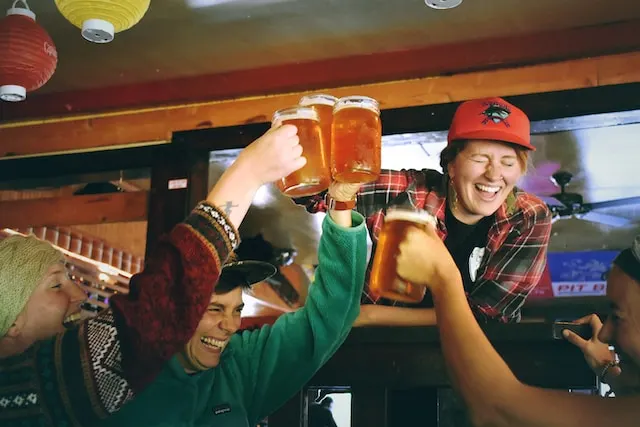Hangover Blues: The Science Behind Post-Drinking Depression
It’s morning. You wake up after a wild night out with friends, and you are hit with a pounding headache, a churning stomach, and a heavy sense of thirstiness. Yep, you’ve got a classic hangover.
We’ve all been there, right?
But what about that other side of the hangover—the one that is less talked about but equally as real?
I’m talking about the hangover blues, that feeling of sadness and anxiety that follows the night of drinking. The hangover depression.
Why does it happen?
What’s the science behind all those depressed feelings of hangover-ed Sundays?
And, of course, how to cope with it!
Hangover Depression: A Hidden Consequence
Alright, let’s get real for a moment. When we think about hangovers, we usually focus on the classic symptoms: the headache, the upset stomach, and the insatiable thirst. But what about the emotional consequences that often come with it? That’s where hangover depression makes its entrance.
Hangover depression is all those feelings of sadness, anxiety, and sometimes even despair that can tag along with your hangover, turning a rough morning into a rough day. And it’s more common than you might think.
You see, all the classic symptoms of the hangover are because your body trying to deal with the aftermath of a night of drinks. In the same way, your brain is trying to navigate the chemical changes caused by alcohol. And believe me my friend, those changes can mess with your mood in a big way.

Hangover Anxiety: A Double Whammy
Did you say something embarrassing? Did you make a fool of yourself? What did you do with your phone?
Apart from physical discomfort, and hangover depression, hangover anxiety is another character in this story.
Sure, not everyone experiences hangover anxiety, but for those who do, it can be a tough addition to an already challenging situation. It’s like your mind is playing tricks on you, making you feel even worse about the night before.
But here’s the kicker: hangover anxiety and hangover depression often go hand in hand. They can feed off each other, creating a not-so-pleasant cycle. Hangover Sundays can be really tough sometimes!

Get 20% off right now! (automatically applied in the checkout)
Depression After Drinking: The Brain Chemistry
As far, all clear, but, let’s talk science.
It turns out that alcohol has a significant impact on the levels of brain chemicals responsible for mood regulation. Two neurotransmitters, serotonin and gamma-aminobutyric acid (GABA), play pivotal roles in maintaining emotional equilibrium.
But, when it comes to depressed feelings of the hangover, serotonin is key. This happy chemical contributes to overall well-being and contentment.
Initially, alcohol can enhance the release of serotonin, leading to feelings of relaxation and euphoria. This initial boost in serotonin is often why individuals perceive alcohol as a mood enhancer. However, alcohol’s effect on neurotransmitters is multifaceted and evolves over time.

How alcohol disrupts serotonin levels
- Direct effect on serotonin: As alcohol is metabolized, it disrupts the production and absorption of serotonin which can ultimately lead to mood disturbances. As alcohol diminishes in the system, the brain undergoes a period of adjustment, marked by a resurgence of depression, sometimes referred to as the “rebound effect.”
- Dehydration: Alcohol is a diuretic, meaning it causes the body to lose fluids. Dehydration is a common consequence of excessive alcohol consumption, and dehydration can affect serotonin levels. Simple, right?
- Sleep Disruption: Alcohol can disrupt normal sleep patterns. While it may initially make you feel sleepy, it can interfere with the restorative REM (rapid eye movement) stage of sleep. Sleep disruption can significantly affect serotonin levels.
The Complex Interaction Between Alcohol and Anxiety
Things are getting more complex when it comes to alcohol and anxiety.
Now, you might have noticed that sometimes, a drink or two can make you feel more relaxed. These initial anxiolytic effects of alcohol arise due to its influence on neurotransmitters such as gamma-aminobutyric acid (GABA).

However, as your body processes alcohol, it starts to disrupt the very systems that help you manage stress and anxiety.
The experience of hangover depression is a result of this biochemical instability. It is important to note that this phenomenon can endure beyond the resolution of the physical hangover symptoms, contributing to prolonged emotional distress.
So, write this down and put it somewhere that you can see it every time you wake up after some drinks: Never Trust Your Hangover-ed Brain. Period!
Coping with Hangover Depression
Alright, we’ve navigated through the science of hangover depression, hangover anxiety, and the intricate dance between alcohol and your brain chemistry. Now, let’s roll up our sleeves and explore some strategies to help you cope with the hangover blues.
1. Moderation is Key
The most effective way to prevent hangover depression is to moderate your alcohol consumption. It might sound like common sense, but it’s worth repeating. Stick to recommended alcohol limits, and your body and mind will thank you the morning after. Know your limits, and if you’re prone to emotional hangovers, it’s a good idea to keep an eye on your drinking habits.
2. Stay Hydrated
Proper hydration is your best friend in the battle against hangover depression. Alcohol is notorious for dehydrating your body, and dehydration can exacerbate feelings of sadness and anxiety. Drink plenty of water before, during, and after your night out to minimize the impact of a hangover.
3. Nutrition Matters
While the thought of greasy breakfasts might appeal to you when you’re nursing a hangover, consider opting for nutrient-rich foods instead. Foods high in vitamins and minerals can help replenish what your body lost during the drinking escapade. Bananas, for instance, are rich in potassium, which can alleviate the physical discomfort of a hangover.
Speaking of bananas, we found the best cure recipe for the hangover:
The banana milkshake with honey.
- The banana will calm your stomach and, with the help of the honey, will build up the depleted blood sugar levels, while the milk will soothe and rehydrate your system. Thank me later.
4. Support and Seek Help
Coping with hangover depression and anxiety can be challenging, but you don’t have to go it alone. Reach out to friends or family who can provide emotional support. Sometimes, just talking about your feelings can be incredibly cathartic. If your hangover depression becomes overwhelming, don’t hesitate to seek help from a mental health professional. They can offer guidance and strategies to manage these emotions effectively.
5. Self-Care and Rest
After a night of drinking, your body needs time to recover. Give yourself permission to rest and engage in self-care. A calm, stress-free environment can help alleviate the emotional toll of a hangover. Whether it’s taking a warm bath, reading a book, or practicing mindfulness exercises, prioritizing self-care can make a significant difference.
6. Learn from Your Experience
Hangovers, both physical and emotional, can be valuable teachers. Use them as an opportunity for self-reflection. Consider what triggered your excessive drinking or emotional response and work on strategies to avoid those triggers in the future. Learning from your experiences can help you make healthier choices and reduce the likelihood of experiencing hangover depression.
7. DO NOTHING
Yes, exactly. Do nothing. You had some extra drinks yesterday, and you feel bad. Now you are caught in thinking loops, and you might see only negativity in the world. Okay, I see you, but deal with it. Sometimes you need to realize one thing: It is what it is! You have to do NOTHING about it.
Believe zero of what your brain is telling you.
Don’t even try to make you feel happier or seek activities that will bring you joy.
Just chill out. Chill out and wait.
Have zero expectations of the day.
Take zero decisions.
The day will eventually pass.
You have to do only one thing: Sleep early!
I promise the next day 90% of this hangover depression will be gone. Your brain will ensure this, to bring the balance. It always does, trust it!
The Perpetual Search for a Hangover Remedy
However, if you are looking for the perfect hangover remedy, you need to know that this quest is as old as alcohol itself! Since the dawn of drinking, people have been on a never-ending hunt for that one thing that can magically erase the pain and misery of a hangover.

From the infamous “hair of the dog” (taking a sip of more alcohol to cure your hangover) to grandma’s secret homemade potion, the world is full of hangover remedies that promise relief. Some swear by greasy breakfasts, others rely on sports drinks or magnesium supplementation, and a few adventurous souls might even dabble in ancient folk remedies involving pickles and strange-sounding herbs.
Why does this search feel never-ending? Well, partly because everyone’s body reacts differently to alcohol, and what works like a charm for one person might not do a thing for another.
But also because, when it comes to the emotional side of a hangover, finding a remedy is a bit like chasing a moving target. Seeking support, self-care, and a clever selection of your nutrition could be very helpful!
Takeaway: Depression after drinking is real; hopefully, now, you know how to deal with it.
Thanks for reading.

Get 20% off right now! (automatically applied in the checkout)
Disclaimer: The article contains affiliate links, which means that if you purchase something after clicking on this link, we’ll probably earn a few bucks from it. However, keep in mind that we suggest only products that we use and deserve our recommendation. This is the only way you can support our efforts to stay on track for seeking a better life, backed by science. But, please advise your physician before you make any adjustments to your habits, diet, and or supplementation.
